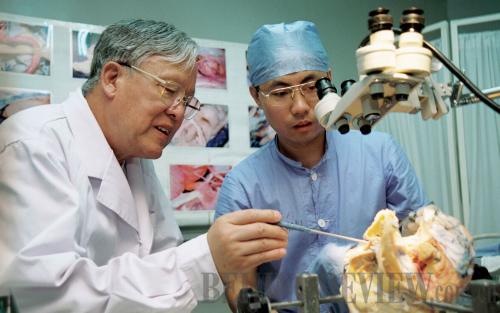|
 |
|
PRESTIGIOUS NEUROLOGIST: Wang Zhongcheng (left), an academician of the CAE, won the State Supreme Scientific and Technological Award in 2008 (XINHUA) |
In addition, academicians are also frequently invited to hold various other positions, such as consultants and university leaders, leaving them too busy to engage in actual scientific research.
"Some do not even have time to check the quality of the papers and reports that bear their names, resulting in scandals and accusations of academic fraud," Wang said.
Zhou Guangzhao, former President of the CAS, is also a leading critic of China's academician system. In December 2005, shortly before newly elected CAS academicians were announced, Zhou, together with 12 other academicians, lambasted the present system at a roundtable meeting.
Zhou said that many academicians were in their 70s and 80s, and most of them had failed to achieve anything significant in terms of research after receiving China's highest honor in science. He also revealed that of the few achievements that had been reported by academicians, some were actually made by their assistants.
"In the academic world, there should not be any authorities; only discussions on an equal footing will really promote scientific and technological innovation," Zhou said.
In 2003, Gu Haibing, a professor at Renmin University of China in Beijing, published a research report on the academician system.
According to Gu, in a market economy, with such incentives as patents and copyrights, the academician system is superfluous. "The title of academician is associated with many lifelong benefits and therefore it stifles competition and thus innovation," he said.
Given China's transition to a market economy, Gu suggested the current academician system could no longer serve its intended purpose, and it should be reformed or removed.
Despite the large amount of criticism, Xu Xianming, President of Shandong University said that China's academician system should not be cast off because it is flawed, but should be improved.
Li Peigen, a CAE academician and former President of Huazhong University of Science and Technology in Hubei, said that some of the problems with the academician system are actually symptoms of broader social and cultural problems in China where personal connections are highly valued.
In September 2010, Rao Yi, Dean of the School of Life Sciences at Peking University and former chair professor at Northwestern University in the United States, and Shi Yigong, Dean of the School of Life Sciences at Tsinghua University, published a paper in Science magazine, saying that to get research funding in China, conducting good research is not as important as networking with bureaucrats and experts.
Rao applied for the CAS membership honor in 2011, but did not survive the first round of review. Rao said that he would never reapply and challenged academicians who are his peers or younger to engage in an open competition in academic performance.
Pan Jiazheng, a famous hydraulic engineer and scientist and academician of both the CAS and the CAE, said that the title of academician should only be an honor, and it should not be tied to any administrative rank or power in resource allocation.
He also called on academicians to exercise self-discipline, and not to act in a way that tarnishes the honor of China's scientific academies.
Chinese Academicians
From 1994 the Chinese Academy of Sciences (CAS) and the Chinese Academy of Engineering (CAE) have added new academicians once every two years. Usually no more than 60 new members are admitted to each of the two academies each time. In 2011, the CAS acquired 51 new members, and the CAE 54.
Over the years, the demographics of both academies have been changing. During the past decade, the average age of academicians has dropped significantly. In 2001, new academicians were typically aged over 60, whereas last year more than 70 percent of newly elected academicians were under 60 years old. Statistics released by the CAS show nearly 90 percent of its new Chinese members have studied abroad.
Women, however, remain firmly in the minority in both institutions. Last year, Zhang Lina, a professor at the Natural Polymer and Polymer Physics Laboratory of Wuhan University in Hubei Province, was the only woman conferred the academician title. She became an academician of the CAS.
In the past four years, no female member has been selected to the CAE. Xu Rigan, Vice President of the CAE, said that few women major in science and engineering in university, and even fewer chose to pursue careers in these fields after graduation.
Both the CAS and the CAE have foreign academicians. The CAS has 64, and the CAE has 42.
Academicians have made outstanding contributions to scientific and technological innovation in China. Among all the 18 winners of China's State Supreme Scientific and Technological Award, which has been given out annually to the most accomplished scientists since 2000, 16 are CAS and/or CAE academicians.
Email us at: wanghairong@bjreview.com | 